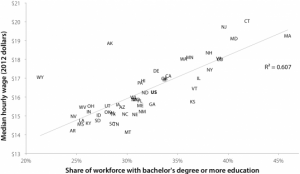Just over two years ago, I proposed an education agenda that was an alternative to the education reform status quo. I lamented the focus on vouchers and teacher merit pay and called for an investment in and support for proven initiatives that would move Tennessee schools forward.
A lot has happened in Tennessee since then. The legislature even passed a very limited voucher scheme this year. The primary voucher vehicle, however, was defeated for the third consecutive legislative session.
But, what’s happening on issues like Pre-K and teacher mentoring? Well, not much. So, here’s a look at the agenda items I put forward two years ago and any action that’s happened on those items:
We should expand the Pre-K program to serve all at-risk four-year-olds by 2017.
Despite Governor Haslam saying that Pre-K expansion might be a good thing, there’s been no legislative push to expand the state’s voluntary Pre-K program. The state did pursue (and win) federal funds to allow Memphis and Nashville to expand their Pre-K programs. However, State Representative Glen Casada did sponsor legislation (HB159) that would have prevented the disbursement of those federal funds since the application did not include all counties in the state. That legislation is on hold in the House Local Government Subcommittee. Between Casada’s bill and efforts by Rep. Bill Dunn, there is serious concern that Pre-K funding could be in jeopardy in 2016. Certainly, that means Tennessee won’t be talking about expanding its Pre-K program to serve all at-risk four-year-olds by 2017.
Tennessee policy-makers should build and launch a new BEP formula in time for the 2015-16 academic year.
This has not been done. Governor Haslam has appointed a task force to study the BEP and that group has yet to issue a final recommendation. In the meantime, a lawsuit claiming the BEP is inadequate was filed this year. In terms of both equity and adequacy, it appears the BEP is broken.
There’s not a new BEP formula for 2015-16 and it remains to be seen if the Task Force appointed by Haslam will make proposals for meaningful improvements by the 2016 legislative session.
Tennessee policy-makers should build a new teacher mentoring program and ensure every new teacher has a trained mentor by the 2016-17 academic year.
Nothing has been done on this. At all.
Tennessee policy-makers should raise the starting pay for all teachers to $40,000 and adjust the pay scale to improve overall compensation by the 2015-16 academic year.
Governor Haslam did promise a teacher pay raise in 2014, only to back down when the revenue picture got a little less rosy. This year, the Governor’s budget includes $96 million in new money for teacher pay, but that doesn’t mean a 4% raise for all teachers. Tennessee’s starting teacher pay is nowhere near an average of $40,000, though State Rep. Jason Powell of Nashville offered a proposal to increase the BEP allocation for teacher pay by $10,000, at a cost of $500 million a year. Powell’s proposal would have brought Tennessee close to the goal of a significantly improved starting pay number for our state’s teachers. But, the price tag was deemed too high and the effort was delayed.
There is much to do for Tennessee schools — efforts that would improve the classroom environment, provide support for teachers, add resources to students, and relieve the tax burden on local governments. So far, these initiatives have either not been discussed or have been put off in favor of education reform fads. There is another legislative session in 2016, of course. And there’s always hope that either a lawsuit or elections or both will cause the General Assembly to re-focus its attention on the investments our state needs to move forward.
For more on education politics and policy in Tennessee, follow @TNEdReport
